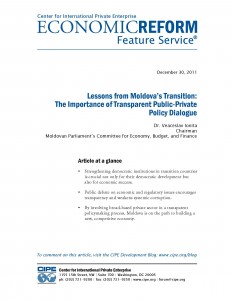The author has been a Member of the Moldovan Parliament since 2009 and is currently Chairman of the Parliamentary Committee for Economy, Budget, and Finance.
Serious and effective economic reform is only possible if Moldova manages to create a transparent dialogue between government officials and the business community. Unfortunately, the private sector in many post-Soviet countries is often equated with crony companies benefiting from political patronage. That view, however, overlooks the broader meaning of the private sector, which includes entrepreneurs and small businesses whose views are rarely represented in the policymaking process.

